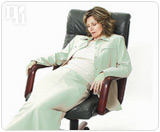Natural hormones are the hormones that are produced in the human body. Estrogen, progesterone, and testosterone are particularly important in women as they control puberty, pregnancy, the menstrual cycle, and menopause.
Bioidentical hormones are produced in a laboratory, from chemical extracts from plants; they cannot be classified as “natural” hormones, because they are not produced in the body.

Bioidentical hormones are an increasingly popular method of treating imbalances in the bodies. There are three different types of hormone imbalance that can be treated with bioidentical hormones. Read on to learn about how bioidentical hormones are used to stabilize the bodies.
Estrogen Bioidentical Hormone Therapy
Estrogen is responsible for ovulation, and therefore plays a key role in the menstrual cycle. Estrogen deficiency can have unpleasant side effects, including: hot flashes, headaches, fatigue, mood swings, and depression. Bioidentical hormone therapy can be useful to address estrogen deficiency, and prevent its unpleasant symptoms. However, less common side effects related to estrogen bioidentical hormone therapy include: the increased risk of breast, ovarian, or uterine cancer.
Progesterone Bioidentical Hormone Therapy

Progesterone also plays an important part in menstruation, as it controls the health of the lining of the uterus, but its primary function is maintaining a healthy pregnancy. Progesterone deficiency can have unpleasant physical and emotional effects, such as fatigue, breast tenderness, mood swings, irritability, and vaginal dryness. Bioidentical progesterone therapy is an immediate and effective way to reduce such symptoms.
Keep in mind that oral progesterone doesn't have the same risk profile as a oral estogen, it has entirely different set of molecular actions in the body.
Testosterone Bioidentical Hormone Therapy
Testosterone is usually thought of as the “male sex hormone”, but it is present in women in small quantities. In a woman, it is responsible for sex drive, strength, and aggression. Testosterone deficiency is the least common of all hormone deficiencies, because it usually exists in such small quantities in women, but it can have unappealing symptoms such as such as deepening of the voice and facial hair growth.
While bioidentical hormones can be an effective way to stabilize imbalances in natural estrogen, progesterone, and testosterone in the body, there are a number of concerns and health risks that have been associated with bioidentical hormone replacement therapy. It is thought that bioidentical hormone use can increase the risk of cancer, stroke, and heart disease. For more information on the risks and benefits, and other alternatives to bioidentical hormones follow the links below.


